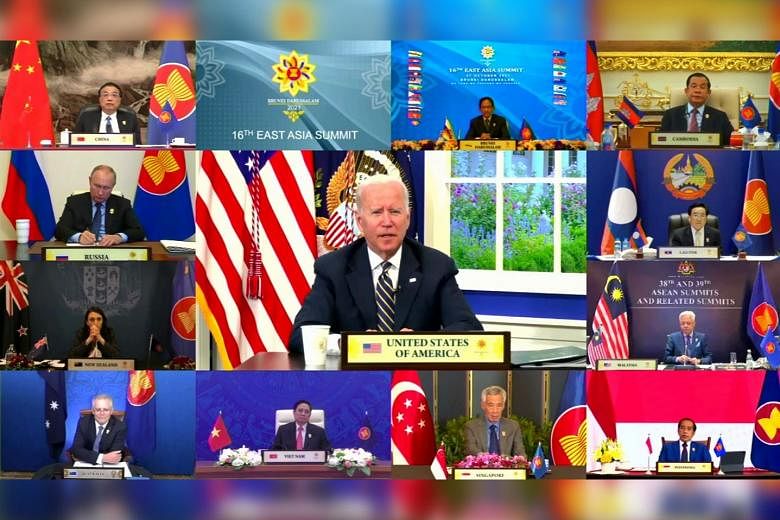BANDAR SERI BEGAWAN (REUTERS, AFP) - President Joe Biden said on Wednesday (Oct 27) that the United States backed efforts to hold the Myanmar junta accountable to its commitments to peace and that he would stand with South-east Asian allies in defending freedom of the seas, democracy and human rights.
Mr Biden joined South-east Asian leaders in rebuking Myanmar's junta, as the Asean summit this week was held without a representative from the country following its top general's exclusion for ignoring peace proposals.
"In Myanmar, we must address the tragedy caused by the military coup which is increasingly undermining regional stability," Mr Biden said at the virtual East Asia Summit on Wednesday.
"The United States stands for the people of Myanmar and calls for the military regime to end the violence, release all political prisoners and return to the path of democracy."
Mr Biden also said the US was deeply concerned by "China's coercive and proactive actions across the Taiwan Strait", a waterway linking Taiwan and the Chinese mainland.
Tensions between Taiwan and China, which claims the island as a renegade province, have escalated in recent weeks as Beijing raises military and political pressure.
Mr Biden also said he would speak out for "human rights in Xinjiang and Tibet (and) the rights of the people of Hong Kong".
China denies human rights abuses in far-western Xinjiang and the Himalayan region of Tibet. It also dismisses concern for freedoms in the former British colony of Hong Kong.
Speaking at the same summit on Wednesday, China's Premier Li Keqiang said ensuring freedom of navigation and overflights in the South China Sea is in the interests of all nations, and countries should resolve their differences via international cooperation.
"The South China Sea is our common home. To uphold peace and stability in the South China Sea, and uphold freedom of navigation and overflight serves everyone's interests," he said, stressing the importance of the Asean bloc's centrality in the region.
In a speech on Tuesday, Mr Biden had denounced the military coup and "horrific violence" in Myanmar when speaking at the virtual Asean summit.
He "expressed grave concerns about the military coup and horrific violence in Burma and called on the country's military regime to immediately end the violence, release those unjustly detained, and restore Burma's path to democracy", a White House statement said, using the former name of Myanmar.
The strongly worded statement came after Mr Biden made public his opening remarks to the Asean meeting in which he made a veiled reference to countering China.
Brunei, as this year's Asean chair, effectively barred junta chief Min Aung Hlaing from the summit by extending an invitation to a "non-political representative" from Myanmar, after an emergency foreign ministers' meeting on Oct 15. This was in response to the junta's stonewalling of attempts to foster domestic dialogue amid Myanmar's political crisis.
Mr Biden also announced discussions with partners in the IndoPacific region would start to develop a framework "that will position all of our economies for the future".
"We look forward to working together with digital economy standards on infrastructure and regional connectivity, on supply chain resilience and anti-corruption and worker standards and so much more," he said.
Critics of US strategy for the region point to its lack of an economic component after former President Donald Trump withdrew from the trade deal now known as the Comprehensive and Progressive Agreement for Trans-Pacific Partnership in 2017.
Japanese Prime Minister Fumio Kishida told reporters he had stressed in Wednesday's meetings his country's resolute stance on "urgent regional situations", including the East and South China Seas, North Korea and Myanmar.
"I also mentioned human rights situations in Hong Kong and Xinjiang, as well as the importance of peace and stability in the Taiwan strait," he said.
Australian Prime Minister Scott Morrison said the Australia-Asean pact would strengthen diplomatic and security ties and promised Canberra would "back it with substance".
"This milestone underscores Australia's commitment to Asean's central role in the Indo-Pacific and positions our partnership for the future," he said in a joint statement with Foreign Minister Marise Payne.
Brunei said the agreement "marked a new chapter in relations".
After the announcement, Australia said it would invest US$154 million (S$208 million) in projects in South-east Asia on health and energy security, counter-terrorism, fighting transnational crime, plus hundreds of scholarships.
China has sought a similar agreement with Asean. Premier Li met Asean leaders on Tuesday, and the bloc's leaders will meet Chinese President Xi Jinping in November at a virtual summit, two diplomatic sources told Reuters.
Mr Morrison sought to reassure Asean that a trilateral security pact agreed last month between the US, Britain and Australia, under which Australia will get access to nuclear-powered submarines, would not be a threat to the region.

